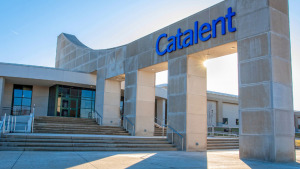
Catalent laying off 400 employees in Bloomington
Since 2020, Catalent had been rapidly expanding operations as it produced vaccines for both Johnson & Johnson and Moderna Inc.

Since 2020, Catalent had been rapidly expanding operations as it produced vaccines for both Johnson & Johnson and Moderna Inc.

The pharmaceutical testing company said it plans to close two isolator facilities in Indianapolis and consolidate them with existing facilities in the United States.
An experimental Alzheimer’s drug modestly slowed the brain disease’s inevitable worsening, researchers reported Tuesday—but it remains unclear whether that will have an impact on people’s lives.
Gantenerumab’s demise is a boost for Indianapolis-based Eli Lilly and Biogen, which are also developing treatments for Alzheimer’s, said Tim Anderson, an analyst at Wolfe Research. Lilly shares were up 1.8% at midday.

The funding amount is one of the largest in recent years for an Indiana-based science startup.
Even as vaccines have reduced the risk of hospitalization and death from infection with SARS-CoV-2, researchers continue to worry about the individual suffering and population-wide threats from long COVID.

Pfizer said people 55 and older who got the omicron-targeting booster had four-fold higher antibody levels than those given an extra dose of the original vaccine.
The previous guidance succeeded in reducing inappropriate and dangerous prescribing, some experts say. But they also were seen as a barrier to care, with some pharmacists refusing to fill prescriptions as doctors wrote them.
The developments amount to what could be the last round of huge settlements after years of litigation over the drug industry’s role in an overdose crisis that has been linked to more than 500,000 U.S. deaths over the past two decades.

Eli Lilly stock has skyrocketed 36% in the past 52 weeks due to strong sales on newer drugs, but the market reacted negatively to its latest forecast.

In a significant expansion of their longstanding collaboration, the partners hope to develop new models for delivering therapies to patients and provide full tuition to between 75 and 100 students each year for 10 years.

Telix Americas is leasing 10,000 square feet at the Crew CarWash headquarters building at 11700 Exit Five Parkway, near Interstate 69 and East 116th Street.

Any variant that winds up dominating in coming months will probably challenge a key line of treatment and protection for people with compromised immune systems—the drugs known as monoclonal antibodies.

The lawsuit was filed this month by a senior sales representative who worked for Eli Lilly for 11 years before resigning in June. The complaint seeks class-action status on behalf of thousand of employees and former employees of Lilly.

Indianapolis-based Eli Lilly and Co. announced Thursday that it has received a Fast Track designation from the U.S. Food and Drug Administration to investigate its diabetes drug tirzepatide for the treatment of adults with obesity.
Point Biopharma is moving aggressively to get its lead drug, a radioactive isotope called lutetium 177, through late-stage trials for prostate cancer.

The FDA approved the drug from Amylyx Pharmaceuticals based on results from one small, mid-stage study in which patients with the debilitating disease appeared to progress more slowly and survive several months longer.
The deal resolves allegations that the pharmaceutical maker violated federal law by paying kickbacks to doctors to persuade them to prescribe its multiple sclerosis drugs.
Researchers at Johns Hopkins University have found whether you’re standing upright or leaning, as well as which side you’re leaning to, could affect how fast the contents of a pill are absorbed into your body.
The FDA’s inspection was focused on production issues at a Bloomington-based plant operated by Catalent, which is helping to bottle and package Moderna’s COVID-19 vaccine.